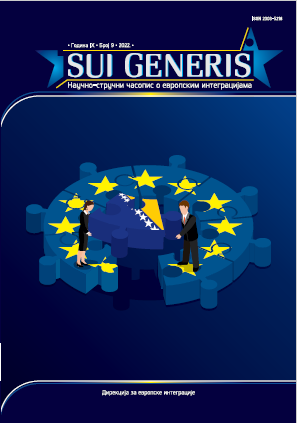Institucionalni sustav Europske unije s posebnim osvrtom na načelo institucionalne ravnoteže
The institutional system of the European Union with special reference to the principle of institutional balance
Author(s): Sanja Bazina Crnokić, Mario RagužSubject(s): EU-Accession / EU-DEvelopment, EU-Legislation
Published by: Direkcija za evropske integracije Vijeća ministara Bosne i Hercegovine
Keywords: European Union; institutions; principle of institutional balance;
Summary/Abstract: As a sui generis supranational organisation, the European Union is specific and unique in its origin, development and functioning, and as such is a constant subject of professional and scientific reflection and research, with the aim of fully understanding and contributing to its continuous integration process, which is equally important for existing and future member states. In this respect, Union's dayto- day and long-term operation is directly dependent on its institutional system, which is mirrored to the same extent by its peculiarities. Therefore, the topic of this paper is particularly focused on the part of the institutional framework of the Union, which includes the European Parliament, the European Council, the Council of the European Union, the European Commission and the Court of the European Union and their mutual relations and way of functioning. Specifically, in line with their competences, the aforementioned institutions act individually or together in numerous community areas, allowing for mutual principled cooperation, but also for inevitable disagreements and diverse interpretations of the same issues. The principle of institutional balance, which serves as the foundation for the actions of the Union's institutions, as well as other relevant principles as well as judicial practice aimed at resolving challenges in matters of jurisdiction, is specifically addressed below in order to fully explore the current relationships as well as the possibilities of improved cooperation. The topic is constantly relevant for the academic and professional community in Bosnia and Herzegovina, given that the next phase of its European integration process is anticipated candidate status for European Union membership.
Journal: Sui generis
- Issue Year: 2022
- Issue No: 9
- Page Range: 53-76
- Page Count: 24
- Language: Croatian

